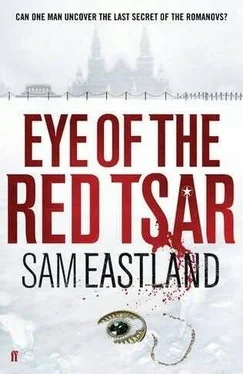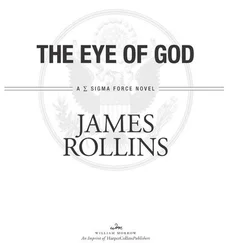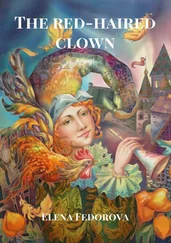As the man approached, Pekkala recognized the close-tailored uniform and slightly bowlegged gait of a cavalry officer. The Major’s face was thin and accented by a rigid waxed mustache.
He walked right past Pekkala without so much as a greeting, but then he seemed to change his mind and he stopped. “Pekkala?” he said.
Pekkala turned and raised his eyebrows, waiting for the man to identify himself.
“Major Kolchak!” said the man, his voice louder than it needed to be in the gallery’s confined space. He held out his hand. “I’m glad we have a chance to meet.”
“Major,” said Pekkala and shook his hand. He did not want to offend the man by admitting that he’d never heard of him before.
“You are expected, I believe.” Kolchak nodded towards the Amber Room.
Pekkala knocked at the door and walked into the room.
Without the sunlight through the open windows, the amber walls seemed mottled and dull. In the half-light, the polished surfaces made the walls appear wet, as if he had stumbled into a cave and not a room inside the Catherine Palace.
The Tsar sat in a chair by the window. Beside the chair stood a small table, on which a candle burned in a holder. The holder was shaped like a dog howling up at the moon, with the candle clenched in its teeth. Two books lay neatly stacked beside the candle.
Only in that sphere of the candle’s reach did the amber seem to glow. The Tsar himself appeared more like an apparition, floating in the darkness. On his lap was a stack of documents-a common sight, since he acted as his own secretary. This meant that, in spite of his fastidiousness, the Tsar was often overwhelmed with paperwork.
“You met Major Kolchak?” asked the Tsar.
“Briefly,” Pekkala replied.
“Kolchak is a man of great ingenuity. I gave him the unusual task of protecting my private financial reserves. In the event of an emergency, he and I have arranged to hide them in a place where, God willing, they will not be found until I need them.” The Tsar lifted the stack of documents and let them fall with a slap to the floor. “So,” he said. “You are late.”
“I apologize, Excellency,” said Pekkala, and was about to explain why when the Tsar cut him off.
“How was the trial?”
“Long, Excellency.”
The Tsar gestured towards the two books. “I have some things for you.”
Now that he looked more closely, Pekkala realized they were not books at all but wooden boxes.
“Go on and open them,” said the Tsar.
Pekkala lifted up the first box, which was smaller than the one below. Opening it, he caught his first glimpse of the emblem which was to become his trademark in the years ahead.
“I have decided,” said the Tsar, “that the title of Special Investigator lacks…” He twisted his hand in the air, like the claw of a barnacle sweeping through an ocean current. “Lacks the gravitas of your position. There are other Special Investigators in my police force, but there has never been a position quite like yours before. It was my grandfather who created the Gendarmerie and my father who established the Okhrana. And you are my creation. You are unique, Pekkala, and so is that badge you will wear from now on. I noticed, as others have done, that certain silvery quality to your gaze. I have never known anything like it. One might think you suffered from a type of blindness.”
“No, Excellency. My sight is not impaired. I know what you are speaking of.” Pekkala reached one hand towards his eyes, as if to touch the light which seemed to emanate from them. “But I do not know why it is there.”
“Let us call it Fate,” said the Tsar. He rose from his chair and, taking the badge from its velvet cushion, pinned it to the cloth beneath the right lapel of Pekkala’s jacket. “You will be known from now on as the Emerald Eye. You shall have absolute authority in the fulfillment of your duties. No secrets may be withheld from you. There are no documents you cannot see upon request. There is no door you cannot walk through unannounced. You may requisition any mode of transport on the spot if you deem it necessary. You are free to come and go where you please and when you please. You may arrest anyone whom you suspect is guilty of a crime. Even me.”
“Excellency…” he began.
The Tsar held up a hand to silence him. “There can be no exceptions. Otherwise, it is all meaningless. I entrust you with the safety of this country and also with my life and the lives of my family, which brings us to the second box.”
Setting aside the now empty container in which the badge had rested, the Tsar opened the larger box.
Inside its fitted case lay a brass-handled Webley revolver.
“This was given to me by my cousin, George V.”
Pekkala had seen a picture of the two of them together hanging on the wall of the Tsar’s study-the King of England and the Tsar of Russia, two of the most powerful men in the world. The photo had been taken in England, with both men in formal boating clothes, after the Tsar had sailed there in his yacht, the Standart. The two men looked almost identical. Their expressions were the same, the shapes of their heads, their beards, their mouths, noses, and ears. Only their eyes showed any difference; the King’s more round than the Tsar’s.
“Go on,” the Tsar instructed. “Take it out.”
Pekkala lifted the gun gently from its box. It was heavy, but superbly balanced. The brass grips felt cold against his palm.
“The Empress won’t have it around,” the Tsar told him. “She says it is too sauvage for a man like me, whatever that means.”
Pekkala knew exactly what it meant, coming from a woman like the Empress, and he suspected the Tsar did as well.
“It was she who had the idea of presenting this to you. And do you know what I told her? I said that for a man like Pekkala, it might not be sauvage enough.” The Tsar laughed, but his face became abruptly serious. “The truth is, Pekkala, if my enemies came close enough to require that I use a gun like this, it would already be too late. That’s why it should belong to you.”
“It is very fine, Excellency, but you know how I feel about gifts.”
“Who said anything about a gift? That weapon and the badge are the tools of your trade, Pekkala. I am issuing them to you the same as any soldier in the army is issued what he needs for his work. I’ll have five thousand rounds of the correct ammunition delivered to your quarters tomorrow. That should keep you going for a while.”
Pekkala nodded once and was about to take his leave when the Tsar spoke to him again.
“This business with Grodek will make you famous, Pekkala. It cannot be avoided. There has been too much publicity since you brought him into custody. Some people thirst for fame. They will do anything to have it. They will betray anyone. They will humiliate themselves and those around them. To be hated or loved makes no difference to them. What they want is to be known. It is a sad addiction, and such people wallow in it all their lives, like pigs in filth. But if you are the man I think you are, you will not like the taste of it.”
“Yes, Excellency.”
The Tsar reached out and grasped Pekkala by the forearms. “And that is why I consider you a friend.”
THE OFFICER FLIPPED THROUGH THE ORDERS. “SPECIAL OPERATIONS,” he muttered.
“Did you see who signed those papers?” asked the second guard.
“Shut up,” said the officer. He folded the orders and thrust them back at Anton. “You may pass through.”
The second guard holstered his gun.
“Tell no one what you see beyond this barricade,” said the officer. “You must drive straight through. You may not stop. You may not speak to anyone. It is important that you give the appearance of normality. Once you have passed through the village, you will come to another roadblock. You must never speak of what you have seen here. Do you understand?”
Читать дальше










